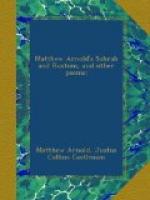“It may be overmuch
He shunned the common stain and smutch,
From soilure of ignoble touch
Too grandly free,
Too loftily secure in such
Cold purity;
But he preserved from chance control
The fortress of his established soul,
In all things sought to see the whole;
Brooked no disguise,
And set his heart upon the goal,
Not on the prize.”
—Mr. William Watson, In Laleham Churchyard.
ARNOLD THE POET
Matthew Arnold was essentially a man of the intellect. No other author of modern times, perhaps no other English author of any time, appeals so directly as he to the educated classes. Even a cursory reading of his pages, prose or verse, reveals the scholar and the critic. He is always thinking, always brilliant, never lacks for a word or phrase; and on the whole, his judgments are good. Between his prose and verse, however, there is a marked difference, both in tone and spiritual quality. True, each possesses the note of a lofty, though stoical courage; reveals the same grace of finish and exactness of phrase and manner; and is, in equal degree, the output of a singularly sane and noble nature; but here the comparison ends; for, while his prose is often stormy and contentious, his poetry has always about it an atmosphere of entire repose. The cause of this difference is not far to seek. His poetry, written in early manhood, reflects his inner self, the more lovable side of his nature; while his prose presents the critic and the reformer, pointing out the good and bad, and permitting at times a spirit of bitterness to creep in, as he endeavors to arouse men out of their easy contentment with themselves and their surroundings.
With the exception of occasional verses, Arnold’s poetical career began and ended inside of twenty years. The reason for this can only be conjectured, and need not be dwelt upon here. But although his poetic life was brief, it was of a very high order, his poems ranking well up among the literary productions of the last century. As a popular poet, however, he will probably never class with Tennyson or Longfellow. His poems are too coldly classical and too unattractive in subject to appeal to the casual reader, who is, generally speaking, inclined toward poetry of the emotions rather than of the intellect—Arnold’s




